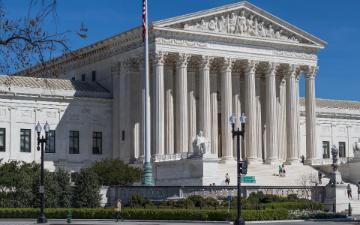
United States Supreme Court Building. Image by Mark Thomas from Pixabay.
David DeCosse (@daviddecosse) is the director of religious and Catholic ethics at the Markkula Center for Applied Ethics, and is a regular commentator at National Catholic Reporter. Views are his own.
As I listened to the oral arguments on April 25 on the Trump immunity case before the United States Supreme Court, I thought for a moment that I had come across a new game: Who can create the most artful hypothetical?
The winner of this game might be the one who tosses out the hypothetical that nails down the perfect line between a president’s official (i.e., can’t be prosecuted) and private (i.e., can be prosecuted) acts and thus lays the groundwork for a utopian “rule for the ages” that was the apparent goal of the hearing for Justice Neil Gorsuch.
Or the winner of this game might be the one who comes up with the hypothetical that has as little as possible to do with the distracting details of the case but that nevertheless miraculously will resolve all future immunity cases in a coming dystopian future.
In this game, the actual Trump case before the court was all but irrelevant. And, as a number of justices made clear, if you didn't understand that, you didn't get why it’s such a monumental deal to prosecute a president for violations of criminal law in a country founded on the idea that no one including the president is above the law. In any case, Justice Samuel Alito made it clear that the case before the court was a distraction. As he put it during the hearing, “I’m not talking about the facts of this case.”
I’m not a lawyer and I understand that hypotheticals can be the lifeblood of the law. But hypotheticals can also be a clever way to avoid the plain truth of what’s staring you in the face. Most of the conservative justices in the case were guilty of precisely such avoidance. We’ll know in their final decision how much that will cost us. And it could be a great deal.
As a matter of justice, similar situations should be treated similarly. Hypotheticals allow us to think about whether one situation is similar to another or if important differences point toward the need for different treatment.
Fair enough. But what about when an issue at law is far more singular: Its differences far outweigh its similarities to what came before and what might come after. Yes, Trump’s reflexive corruption recalled Nixon’s use of burglars and coverups. Sure, maybe there will be some dystopian future of former presidents being recklessly charged for made-up crimes.
But never before in our history has a president tried to block the peaceful transfer of power. Moreover, there is a vast, detailed historical record that documents the singular, whopping fact of January 6, 2021. Still more, it’s only the person who tried to block the transfer of power who introduced the idea of a dystopian future when he began promising to prosecute political enemies should he regain office. In the hearing, Amy Coney Barrett and the liberal justices kept trying to pull the illusory conversation back to the specific implications of those hard facts.
As Gorsuch and Alito and others leaped from one distracting hypothetical to another, I found myself thinking of the phrase “the method of avoidance” used by 20th century American philosopher John Rawls. For Rawls, the phrase referred to the way that people living in pluralist societies need at various times to put aside their deepest convictions for the sake of living in peace. Rawls’ “method of avoidance” has been hated for years by conservatives who argued that it led to a liberal society lacking all conviction. But listening to the justices toss out their hypotheticals, I thought we were seeing a new method of avoidance: Not putting aside our deepest convictions for the sake of peace but doubling down blindly on our deepest convictions at the expense of justice.
And then I thought more darkly of the work of Hannah Arendt, the great analyst of the rise of Nazism. Looking back on how everything went wrong in Germany in the 1930s, she argued that there was a universal breakdown of what she called “personal judgment.”
For her, this was a technical term and meant that human beings have a capacity to judge things rationally and to do so in a way that transcends emotion and self-interest. But she also said that it was a crucial aspect of this capacity to judge that it accepts and evaluates the here-and-now for what it factually is. To judge meant that one refused to turn away from the outrageous by seeking distracting explanations in amorphous generalities like the forces of history or a one-size-fits-all rule or a hypothetical blizzard of what ifs.
In other words, to this non-lawyer listening to oral arguments, the Trump immunity case was never about fancifully finding a “rule for the ages” but was always about squaring up to unprecedented presidential criminal responsibility in the here-and-now.
